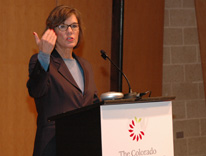
By Chris Casey | University Communications
DENVER - For the first time, more than 20 percent of adult Coloradans are obese, making it imperative that strategies and resources for healthful living -- key aspects of the soon-to-open Colorado Center for Health and Wellness -- be developed to reverse this dangerous trend.
The 2011 Colorado Health Report Card was announced this morning at the King Center on the Auraria Campus. The report included remarks by Anne Warhover, president and CEO of the Colorado Health Foundation, which has released the report card for the past six years; Michele Lueck, president and CEO of the Colorado Health Institute; and Christopher Urbina, MD, MPH, executive director and chief medical officer of the Colorado Department of Public Health and Environment.
The report card includes 38 health indicators spanning five life stages, from infants to the elderly. Colorado's overall grade remains a C, where it's been since 2009.
Getting significant attention this year is the fact that 22 percent of adults in the state are obese. "The big headline news ... has to do with our breaking the 20 percent barrier -- not in a positive way," Lueck said. "We have more than one out of five of us, nearly one out of four of us, who is obese in the state. We're still No. 1 (in lowest overall obesity rates nationwide) but, as we suggested, we're No. 1 in an increasingly obese state."
James Hill, PhD, executive director of the Colorado Center for Health and Wellness at the Anschutz Medical Campus, said the report offers good news in that Colorado remains the leanest state, but warns "we are losing ground. This report card shows that we need to ramp up our efforts to address obesity. Part of this is making sure we nurture new ideas, and new research that may lead to better strategies to address obesity. The new Colorado Center for Health and Wellness (which opens next month) will do exactly that."
The state's grade for Healthy Children improved from a D+ to a C-; Healthy Beginnings stayed at a C; Healthy Adolescents and Healthy Adults stalled at B- and B, respectively; and Healthy Aging fell from an A- in 2010 to a B in 2011. In part, according to the report, the latter decline reflects the percentage of older Coloradans with mental or physical health limitations that prevented them from participating in their usual activities.
A supplement to this year's report card highlights prevention initiatives that show positive returns on investment.
For example, said Lueck:
- For every dollar invested in getting children immunized, the state realizes a cost savings of about $16.
- Eight million hours are lost every year because of children's tooth decay issues. Thirty percent of Coloradans currently don't get fluoridated water.
When asked how the state will address the obesity problem, Warhover said, "Multiple strategies -- you've got to attack it from all angles." She listed a variety of school- and community-based efforts that encourage healthier eating and more exercise. The key, she said, are collaborative, integrated approaches that tailor obesity prevention to specific communities.
Urbina agreed. "It really has to be comprehensive -- from when you talk about prenatal and breast-feeding, as an example, to building core strength in the elderly in terms of exercise and access to parks and recreation," he said.
All speakers emphasized that Colorado's Health Report Card is unacceptable and that if we are to achieve the goal of becoming the healthiest state in the nation, action must be taken to improve the grades.
"This really is a cry out for us to get behind preventative and public health strategies," Lueck said, "because so much of our health is really determined by lifestyle and behavior and the like."
That's where the Colorado Center for Health and Wellness will play a key role.
"We will provide a rich environment that brings together leading researchers to develop new ways to thinking about reversing obesity and we will conduct research to test these new ideas," Hill said. "Then, in collaboration with many community partners, we will translate the science that works into programs that impact peoples' lives in the community. Colorado can and should be the first state to lower obesity rates."
For detailed information on the report card's key indicators, visit www.ColoradoHealthReportCard.org.
(Photo: Colorado Health Foundation President Anne Warhover talks about the 2011 Colorado Health Report Card.)
###
Contact: christopher.casey@ucdenver.edu




